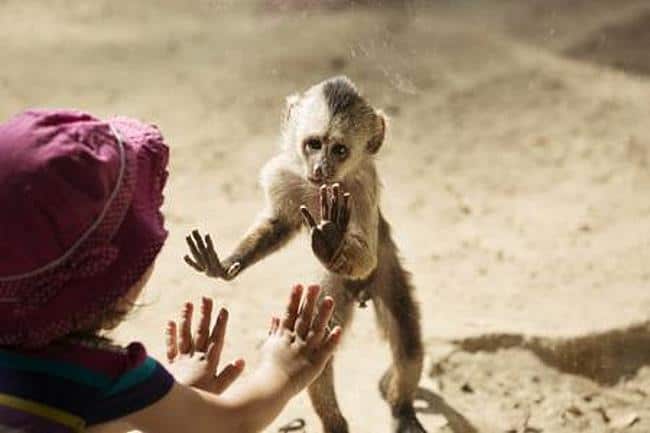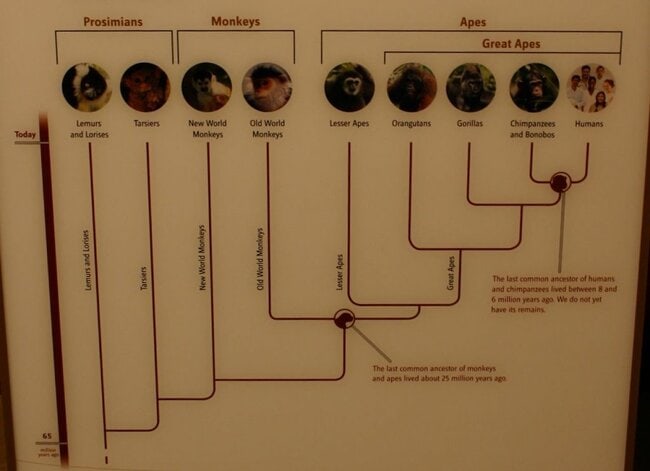If evolution is true and we really did evolve from monkeys, why the hell are they still here? Similar questions have been among the most common ones asked of biologists for decades.
If you ask Google, you will find millions of responses, yet people still seem to demand new and clearer answers. The question gets repeated in different forms: Why are there still chimps (or gorillas, or apes) if we evolved from them?

There are actually two ways to answer questions like these:
- Answer #1: Humans did not evolve from monkeys—at least not the kind we see today.
- Answer #2: The monkeys that we evolved from are no longer here.
If that sounds contradictory or confusing, it is. But only because the original question is equally confusing to anyone familiar with the basics of biology.
What you know about evolution may be wrong
Evolution is not one long string or staircase of life as many understand it. Animals do not evolve into better and better versions of themselves. They also do not evolve from one existing species into another. All the animal species that exist today have evolved from something else that is no longer here.
A chimpanzee and its descendants will never turn into orangutans, and orangutans will not turn into us. An okapi will not turn into a giraffe someday, and a horse is not an advanced version of a donkey.
No doubt this linear misconception about evolution originates from an illustration Rudolph Zallinger published in 1965, later titled “March of Progress.” The one with different apes and humans marching in a line:

From the illustration, one might conclude that evolution is a process of Australopithecus becoming Homo erectus becoming Neanderthals becoming Homo sapiens. Which isn’t true.
I do not want to dive into explaining how and why this illustration unintentionally created the biggest misconception about biology ever (Hank Green from SciShow explains it well here), but the basic fact is that evolution just doesn’t work that way.
How are we and monkeys related?
The tree of life is actually a tree—similar to what you might recognize as a family tree. In that sense, we and monkeys are cousins, because we did not evolve from them, nor they from us, but we do share a long-ago “grandparent.”

Our closest cousins among the living species are chimpanzees. We share 96% of our genome and have a common ancestor that lived about 6 million to 8 million years ago.
The estimate is a broad window not because we can’t tell more accurately, but because species do not just pop up at a specific point of time.
How do new species emerge?
New species arise when two populations of one species become separated either by a physical barrier (an ocean, mountains, distance) or by an intangible one (cultural differences, mating preferences).
If two populations stop mating with each other, their genetic material eventually will become distinct enough that they could no longer breed and produce fertile offspring even if they tried. At this point, there is no turning back, and the two new species will only grow more and more different.
To reach this point, however, takes time, and occasional hybridization does occur, slowing the process down a bit—but if the separation of two populations is strong enough, it continues no matter what.
This isn’t only a theoretical process reconstructed from fossil records and genetic differences between closely related species. It can actually be observed happening in animals living right now.
But back to chimps. We may argue about when and why exactly we and chimpanzees took different paths of evolution, but one thing is crystal clear:
Humans did not evolve from chimps. Chimps were not even “there” yet when we supposedly evolved from them.
The answer is similar for any other extant species that we might be thought to have evolved from. We did not evolve from any animal species living today, but we all share a common ancestor if we look far enough into the past. It is true for algae and it is true for monkeys.
So, what about those monkeys?
Did we evolve from monkeys or did monkeys evolve from us?
The common ancestors we share with the monkeys of present-day Africa lived at least 20 million years ago. Monkeys of that time were different from those living today.
Let’s imagine that a clever monkey might ask: “If we evolved from humans, why are there still humans?”
![]()
If that sounds weird to you, note that the original question sounds equally weird to biologists.
And speaking of weird: I find it weird that many people react strangely when people are compared to animals. As if it were a bad thing.
Why can’t the people who view humans as better than other animals just say: “Sure, we might be like them in some ways, but we have evolved, and that’s why we are better than them”? If you need to be better, then be better. At least evolution gives you a plausible way to justify it.
No one even blinks when house cats are compared to tigers or lions. Why is that? No one has ever asked “If cats evolved from tigers, why are there still tigers?”—though that question, in essence, is no different from all of the above.